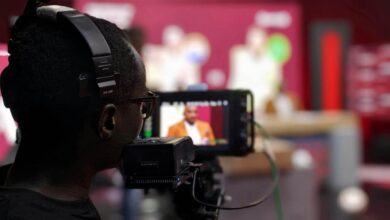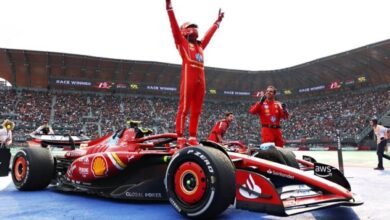Famous Anti-Vacciners: How Do Celebrities Influence Our Lives?
With regard to anti-vaccine celebrities, it is important to ask how they get that influence on people.

In this pandemic, some anti-vaccine celebrities can hinder the work of public health. Photo: AP PHoto
LatinAmerican Post | Luis Ángel Hernández Liborio
Listen to this article
Leer en español: Famosos antivacunas: ¿Cómo logran las celebridades tener influencia en nuestras vidas?
We all know someone who likes conspiracy theories, who spreads among his acquaintances that man did not reach the Moon, that Elvis Presley has not died or that a "New World Order" is coming. In most cases their ideas are harmless since they do not harm anyone, nor do they go beyond the scope of a meeting, but what happens when these people are famous? Things can be very different, an example is what happens in this pandemic with anti-vaccine celebrities who hinder the work of public health.
The famous anti-vaccines
Being famous is not necessarily synonymous with being an expert in everything. There are honorable exceptions such as Queen guitarist Brian May who is also a respected scientist, however, while most celebrities and influencers are not, there are some who behave as if they are. Such is the case of the actors Robert de Niro, Rob Schneider, Jim Carrey, and Alicia Silverstone, the athletes Dwight Howard and Novak Djokovic, the singer Miguel Bosé and the activist Roberto Kennedy Jr. They all have in common their support for the anti-vaccine movements, even before the current pandemic. Like any celebrity, they have millions of followers who blindly believe their words, so the weight of their voice translates into a large number of people who decide not to get vaccinated.
Their influence extends even more when they have social networks because their followers have direct interaction with what celebrities write. When the first vaccines during this pandemic were authorized, Miguel Bosé spoke out against them on his Twitter account. The singer denounced the implantation of chips, an international conspiracy led by Bill Gates, and even accused the president of the Spanish government, Pedro Sánchez, of having joined the conspiracy. The network reacted, although the ideas of the Spanish singer sounded crazy, they had a great echo, quickly going viral, and defenders and detractors of Bosé's words emerged.
"Miguel Bosé" por este hilo que hizo en Twitter, dónde explica una teoría que acusa a Bill Gates de crear una vacuna contra el #COVIDー19 que contendría un micro chip, con la finalidad de controlar a las personas y saber todos sus datos, este chip se manejaría por las antenas 5g pic.twitter.com/bjVpThNnmT
— ¿Por qué es tendencia? (@estendenciavzl) June 9, 2020
Although the scientific community has extensively reported that vaccines are safe, celebrities continue to emerge against them, the big problem is that some of their followers blindly believe them. In January of this year, the influencer Ygona Moura, who was known for questioning the veracity and severity of the pandemic, died in Brazil due to COVID-19, according to information from O Globo. She attended luxurious parties without sanitary measures, also inviting her followers to clandestine parties through his social networks. The result was her infection and subsequent death without being clear about how many of his followers could have had the same fate in one of the countries with the most cases in the world.
You can also read: The Power of Celebrities at the Service of Good Causes
The power of being a celebrity
Literally, millions of vaccines are spoiled in the United States due to low vaccination rates in some states, governments working against the clock to use or redistribute as many as possible before they expire, according to the medical journal Stat. The influence of the anti-vaccine movement is notorious, it has hampered vaccination processes all over the world. Here is visible the power of influencers and celebrities who manage to convince millions of people not only not to get vaccinated, but also in all kinds of theories such as flat Earth or the deniers of events such as September 11, despite scientific evidence that they show that they are in error.
How is it that a person can believe more in a movie actor than in a prestigious scientist? This fact is not exclusive to the news, we see it daily with advertising, which takes advantage of the impact of the image of a celebrity to sell us a product. It is not the same to sell a soft drink brand through an unknown person as, through Lionel Messi, the attention and influence on the consumer are not the same. In the same way, having a negative side also has a positive side, many celebrities use their image to give voice to charitable causes related to human rights and the environment.
Arrestan a la actriz Susan Sarandon y a cientos de mujeres más por protestar contra brutalidad a migrantes en EU https://t.co/SkAe1rJDck pic.twitter.com/7VRht07EUt
— Tumbaburrass Oficial (@tumbaburrass) June 30, 2018
In a highly digitized society, where influencers dominate, it is easy to understand why few people question what these characters say. Celebrity culture is not new, there have always been figures whose lifestyle seeks to be emulated by society, just see how many people are still fascinated by royalty and its trends. In the last 70 years, the search for the perfect body, influenced by celebrities, has caused many men and women to undergo aggressive diet plans and surgeries. Some cases go to extremes such as that of the Iranian influencer Sahar Tabar who underwent more than 50 surgeries to look like Angelina Jolie, according to the newspaper Clarín, which led her to be arrested for going against Islamic laws. The sense of community and closeness that social networks give make people know celebrities beyond their work and that familiarity gives them credibility, even above experts. We do not yet know if this will have a limit or if we will continue to see its power and influence grow in the future.




